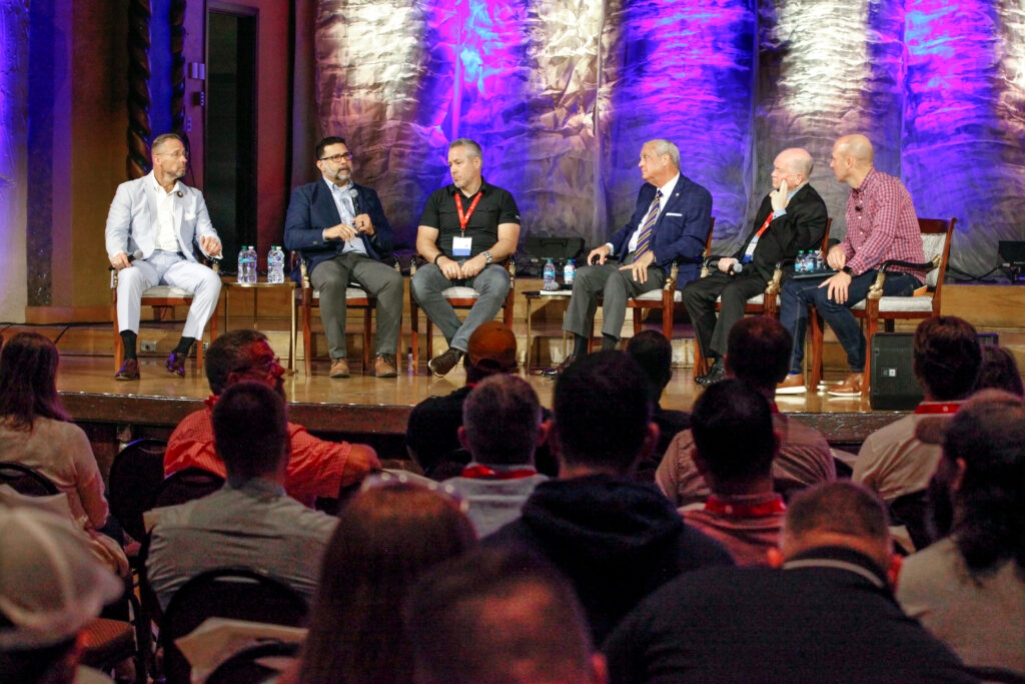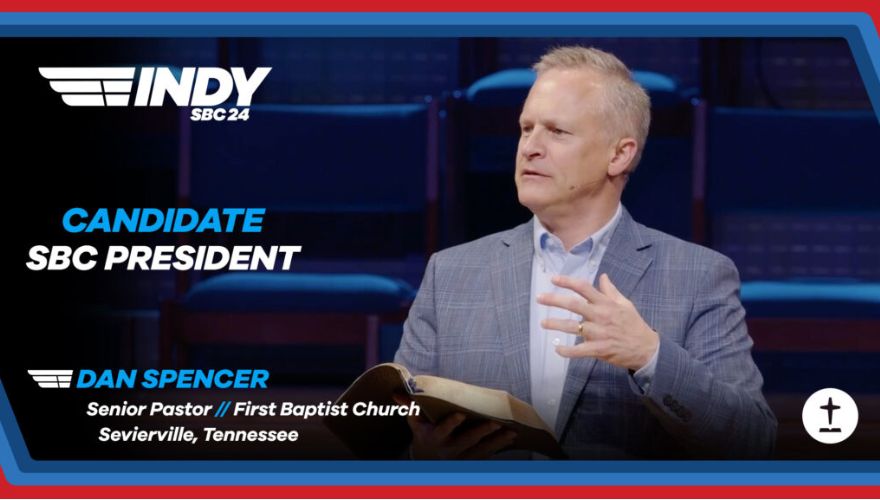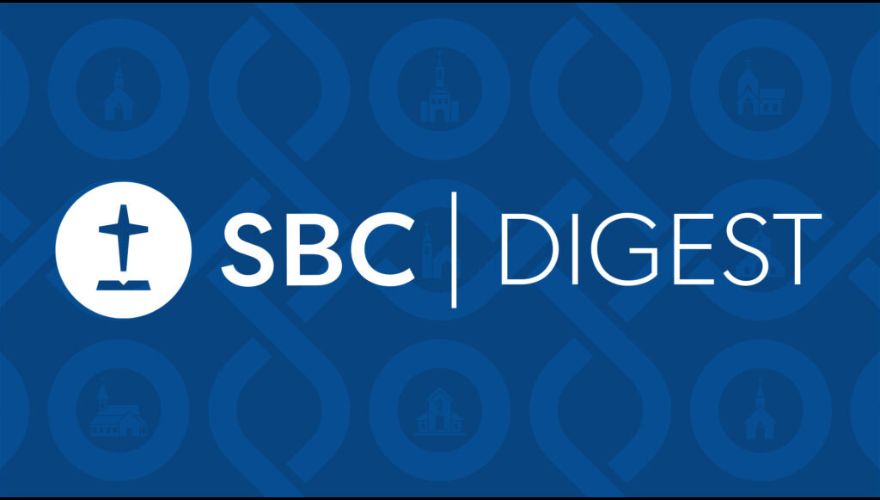
(Left to right) Clint Pressley, Juan Sanchez, J.D. Greear, Albert Mohler, Daniel Akin and Jed Coppenger composed the panel discussing SBC-related issues at the Baptist21 breakfast June 11.
INDIANAPOLIS (BP) — Discussions over the Law Amendment, sexual abuse reform and cooperation in the Southern Baptist Convention (SBC) were parts of a discussion among panelists at a breakfast hosted by Baptist21 on Tuesday morning, June 11.
Emceed by Jed Coppenger, lead pastor of Redemption City Church in Franklin, Tenn., panelists were Daniel Akin, president of Southeastern Baptist Theological Seminary (SEBTS); Albert Mohler, president of Southern Baptist Theological Seminary (SBTS); J.D. Greear, past SBC president and pastor of The Summit Church in Durham, North Carolina; Juan Sanchez, pastor of High Pointe Baptist Church in Austin, Texas; and Clint Pressley, pastor of Hickory Grove Baptist Church in Charlotte, N.C.
The event was held at the Indiana Roof Ballroom near the Indiana Convention Center.
Talk began with the amendment originally introduced by Virginia Pastor Mike Law two years ago in Anaheim that originally called for a constitutional amendment saying women could not be affirmed, appointed or employed “as a pastor of any kind.” Sanchez’s friendly amendment last year affirmed by messengers changed that language to “only men as any kind of pastor or elder as qualified by Scripture.”
Akin told the crowd he voted for the amendment last year in New Orleans, then he was against it. In recent weeks he has returned to his original position.
“Some things have transpired in terms of statements and positions articulated,” he explained.
Emphasizing he does not believe “that there are thousands of churches out there with women pastors,” Akin nevertheless cited “a lack of theological precision” on the subject when “the Bible is crystal clear” on the role of pastor/elder/overseer being reserved for men.
There are complementarians on both sides of the amendment discussion, he added.
“I don’t think it’s the end of the world — not even close — if it passes or doesn’t pass,” Akin said. “I think Southern Baptists will be very clear moving forward that we are a complementarian convention of churches. That’s who we have been since the Conservative Resurgence. That’s who we are today.”
As the only voice on the stage in opposition, Greear cited concern over potential “collateral damage” from the amendment. In particular, the verbiage of “any kind of pastor” could have unintended consequences in ethnic congregations where women have historically functioned in roles with the title of “pastor.”
“For others, including the authors of [the amendment], it includes women called ‘minister’ that they believe are acting in the capacity of pastor,” Greear said. “Our Credentials Committee is already confused as to what this means in terms of enforcement and what that looks like when it’s mandated in the constitution.”
Sanchez countered with his own observations of ethnic churches and the potential negative effect of the amendment’s passage.
“I don’t buy the argument that this is putting undue pressure [on those churches],” Sanchez said. “This is not something I hear in like-minded churches. … We have to have a way to actually encourage pastors to be faithful to Scripture.”
Those opposing the amendment have expressed concerns over inordinate amounts of time being spent — by the Credentials Committee as well as in debate during annual meetings — to investigate the expected increase in churches submitted who have a woman serving with the title of pastor, regardless of function.
Mohler presented the same possible scenario even though he is “avidly, eagerly, determinedly for the Law Amendment.”
“I believe that if it does not pass at this convention by the majority necessary, then we are sentencing ourselves to … who-knows-how-long of dealing with this year by year, church by church, congregation by congregation, title by title.
“… I do a different math. I see many more churches that are confused on this and I hear from people reaching out … from those churches. I think there are churches interested in being a part of the SBC who are coming from different places where this is not so clear.”
Mohler cited a 1984 resolution on ordination and the role of women in ministry.
“This is not just an eccentric issue that has come from nowhere,” he said. “This was central to the concern of conservative evangelicals in the Southern Baptist Convention back in the 1980s. … Since then, the SBC has taken consistent stands to clarify further what this means, all the way to the Baptist Faith and Message 2000.”
Regarding sexual abuse reform, Pressley spoke on his church recently reporting a case involving a student ministry volunteer.
“[The SBC] is much further down the road than we ever have been,” he said on the convention’s steps toward abuse response. “In 2018, we weren’t talking about sexual abuse. Then when everything hit, [the subject] came right to the top.”
Hickory Grove’s use of MinistrySafe prepared volunteers for the situation no church wants to face.
“We knew what to do, and so when the crisis hit, our people responded,” said Pressley.
The panel briefly discussed a call to add the Nicene Creed to the Baptist Faith and Message. Mohler, his background in systematic theology and appreciation for the creed notwithstanding, said he would not be in favor of such a motion.
“If we put it in, we’ll need to add a lot of things,” he said. “[The BF&M] is not a catalog of confessions.”
(EDITOR’S NOTE — Scott Barkley is national correspondent for Baptist Press.)


